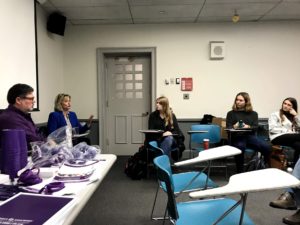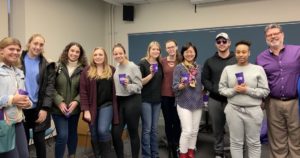Dr. Yifeng Hu’s COM 345 – New Media and Health Communication class hosted Jeff Borghoff and Katrien Goethals as guest speakers on February 11, 2020. Diagnosed with Younger Onset Alzheimer’s Disease at age 51, Jeff is an alumni member of the National Early-Stage Advisory Group. Borghoff also works closely with the National Alzheimer’s Association and is a staunch advocate for Alzheimer’s research and awareness. Borghoff spoke to the class about life with dementia, policy for both patients and caregivers, research, and destigmitzarion.
Dr. Hu invited Borghoff and Goethals to speak in order for her students to learn more about dementia, a group of diseases and conditions that might be tackled by emerging technologies such as Virtual Reality. Specifically, she wanted her students to learn what is lacking in health communication regarding dementia and what it is that dementia patients and their caregivers need. Then students will explore how technology may help caregivers and curious viewers alike build compassion for patients with dementia.
The World Health Organization defines dementia as “a syndrome – usually of a chronic or progressive nature – in which there is deterioration in cognitive function.” Dementia is an umbrella category of diseases which encompasses illnesses such as Alzheimer’s disease, frontotemporal dementia, Lewy Body dementia, and Parkinson’s. Each different form of dementia includes different symptoms, ranging from hallucinations to mood swings, forming unique challenges for patients and their caregivers. Thus, specific diagnoses are important.
Borghoff explained that it is not uncommon for those with younger onset dementia to be misdiagnosed many times before their conditions are properly identified. Often times, doctors would say: “It’s just aging. I sometimes forget things too.” This lag can lead to a lack of treatment at the onset of the disease, when it is needed most. Moreover, misdiagnosis or dismissal by providers/family/friends is disappointing and hurtful to patients. Borghoff said when he was diagnosed, his friends commented: “you don’t look like you have Alzheimer’s!”
Living with dementia can be an excruciating experience for patients. Many forms of dementia impact memory, which can make many daily tasks rather difficult. For instance, those with dementia may have trouble counting change at a checkout line. This situation can bring a lot of pressure to the patient while also facing frustration from the checkout worker.
Not only are patients impacted by dementia, but so are their caregivers. Katrien, another guest speaker who once acted as a caregiver, shared some of her personal experience. Just out of college, Katrien acted as a caregiver for her mother, who had been recently diagnosed with Frontotemporal Dementia. Katrien said that it was difficult and overwhelming to take care of her mother while also raising kids and caring for her grandmother who also had dementia. Furthermore, Katrien had to watch as her mother’s personality began to shift from that of the woman she had grown up with.
Throughout his lecture, Jeff made it very clear that dementia will become increasingly apparent as our society progresses. That is to say that as our population ages, dementia will become increasingly diagnosed. Thus, it is vastly important that more is done to help raise awareness and ultimately cure dementia. However, the roadblocks that advocacy for dementia faces are not simply medical. In fact, dementia is a victim of many misconceptions that lead to a lack of attention and stigmatization. It is our duty as public health scholars to become more educated on dementia so that we can help protect the future generation of patients.
Fortunately, Jeff mentioned a few resources for those interested in dementia advocacy. Beingpatient.com, a news source that shares information on dementia research and advocacy, provides a voice to those impacted by the neurological illness. The National Alzheimer’s Association, which includes a Greater New Jersey Chapter, not only provides aid and support to patients and families, but also raises research fund to find a cure and advocates for awareness regarding dementia
Written by: Sarah Carlson


